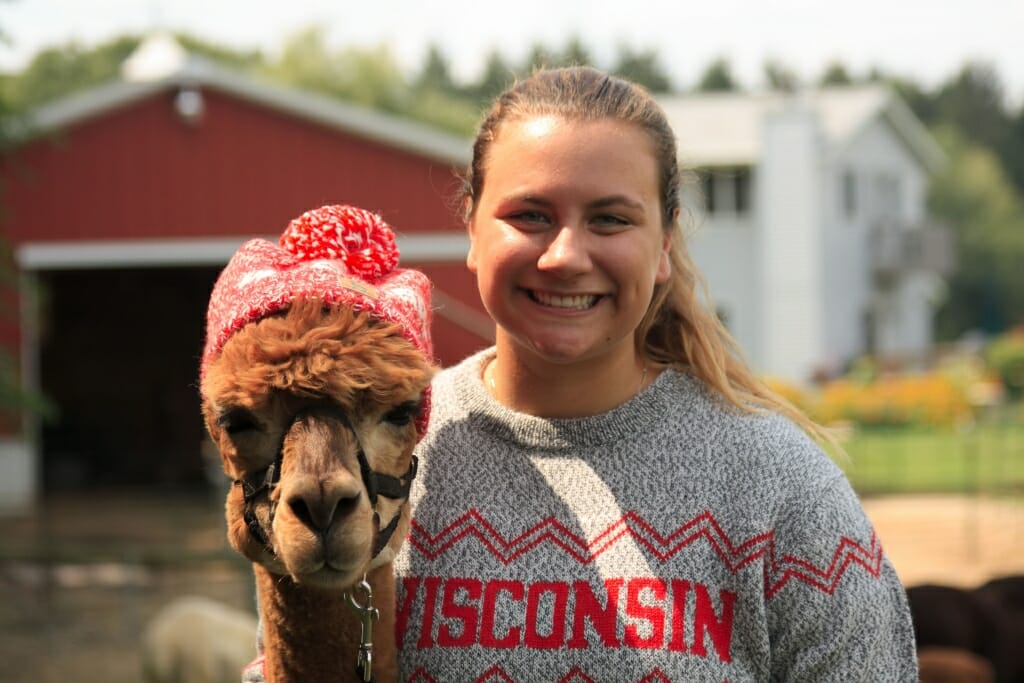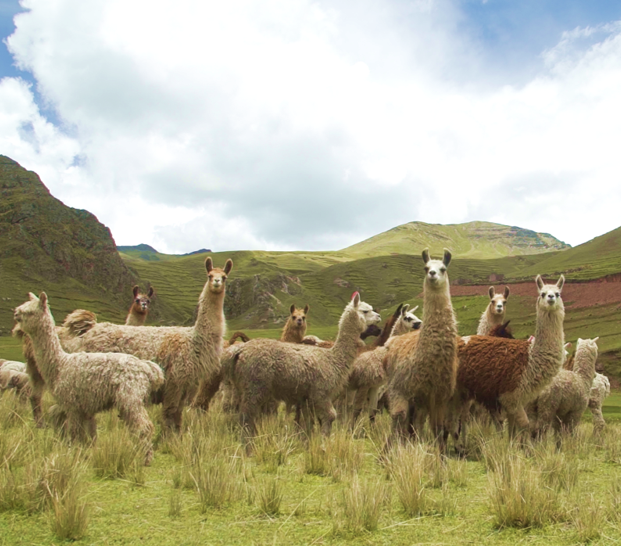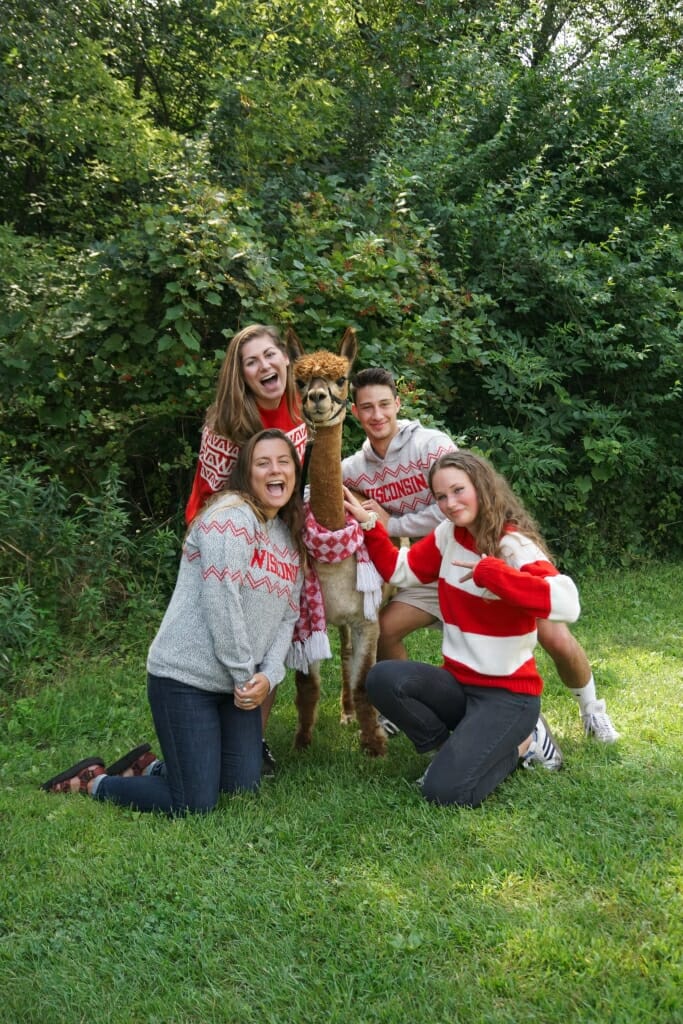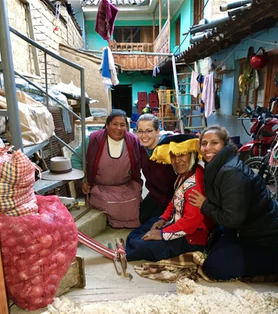Fuzzy fur of Peru’s Alpacas serves as inspiration for alum’s new UW-branded clothing company

Two models – one human, one camelid – show off CAMPO’s products. CREDIT: Benjamin Pierce and Kristina Smeshko
Eighty seven percent of the world’s alpaca population are scattered across the highlands of Peru, but when UW alum Katie Lorenz travelled there between jobs in 2014, she didn’t know that.
Alpacas were always close by as she traversed the Peruvian landscape for two weeks. In markets, Peruvians slung entire wardrobes made from Alpaca wool and proffered baby Alpacas for tourists to snuggle, and in the Andes mountains, droves of Alpacas grazed on grass and hay.
But she was hooked by the material from the start. Soft and luxurious, the fur is both warmer and softer than wool while also being hypoallergenic.
The trip would lead to the creation of her own brand, CAMPO, that uses the lustrous fiber of the nation’s most famous – and fuzzy – export.

Alpacas graze in a field in Peru. CREDIT: Katie Lorenz
But something didn’t feel right to her. Women would spend weeks hand-knitting and sewing garments only to sell them to the middlemen for next to nothing, making it hard for them to sustain themselves and escape poverty.
In her time in the Wisconsin School of Business and since, Lorenz has prized social impact companies that operate on a “triple bottom line” framework, prioritizing not just wealth, but also social and ecological benefit. She knew there was a better way to serve the the women, craftspeople, and their communities.
“I believe that business should be a force for good – as a business woman this is this is something positive that I could do.” Lorenz said. “I think sometimes large, massive corporations lose sight of what’s important, possibly destroying communities and people along the way, which I would like to prove as a business is not necessary to grow or be successful.”

Models wearing CAMPO’s clothes pose next to an Alpaca. CREDIT: Benjamin Pierce and Kristina Smeshko
Lorenz launched CAMPO (pronounced comm-po) on Kickstarter in May. Within a week, she had surpassed her fundraising goal of $7,500. By the end of the campaign, she had more than doubled it.
Lorenz knew from the start that she wanted to make UW-branded gear she could wear to Badger football games, and after jumping through more than a few hoops to secure licensing agreements with the university, she made it a reality, designing a couple Incan-inspired Wisconsin sweaters.
“I love this university, I’m a crazy Badger, and I felt like if I was going to do a college and I didn’t do it here first it’d be like cheating in some way,” she said. “And it’s just a perfect place for something like this. [Madison’s] a little bit more liberal, and I like to think that Wisconsin people kind of care about the environment and sustainability.”
CAMPO, a portmanteau of the Spanish words cambio positivo meaning positive change, lives up to its name. Lorenz’s method is to leverage the traditional knitting cultures of Peru and its massive Alpaca population to pull women out of poverty.

Lorenz and some of the women in Peru she employs to make CAMPO’s clothes. CREDIT: Katie Lorenz
Outside Arequipa, Peru, Lorenz contracts women to knit hats and headbands. Six to eight women in each area work in what Lorenz calls “daycare work centers,” an alternative workplace arrangement that lets women bring their children to work. While their kids play, they can learn the knitting patterns, make as many hats as they’d like, have a community, and most importantly, make money.
The chance of a family in Peru succeeding increases significantly when the mother has her own source of income and can be independent, Lorenz said. Since all of the women working for CAMPO have children, she said it is crucial to adapt the workplace to their life, not the other way around.
Lorenz also works with a non-profit out of Cusco, Peru, called FairServices that works to break the cycle of poverty by pulling girls out of it. Run by two Peruvian women and a Dutch man, it experiments with a variety of different programs to find solutions.
Lorenz is recruiting volunteers from college students in the U.S. to assist the non-profit’s new “Chaska” program (meaning “star” in the native Peruvian language Quechua) which has selected 30 promising girls in bad situations from urban Cusco to receive a personal mentor, after school coaching and free education. She hopes to one day devote a certain percentage of CAMPO’s profits to the program.
From here on out, the path for CAMPO can lead many ways, Lorenz said, including a possible high-end women’s line and new university-branded clothes. But wherever the brand may go, it all comes back to the little downy animal all-too-often mistaken for llamas and the impact they can have on the communities that depend on their fur.
“The purpose of the company is creating positive impact,” Lorenz said. “And for both differentiation in the products and its ability to keep you warm during Wisconsin’s winters, the Alpaca … could really do well here,” she said
Four years after her first trip to Peru, Lorenz has realized a company that is ethical, turns out a high-quality product and, fortuitously, helps her to stay cozy during winter Badger football games.
For more information, visit: www.campoalpaca.com




